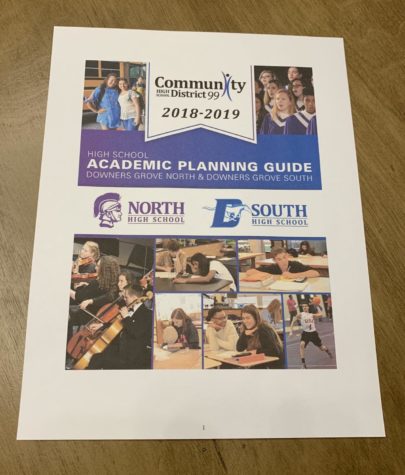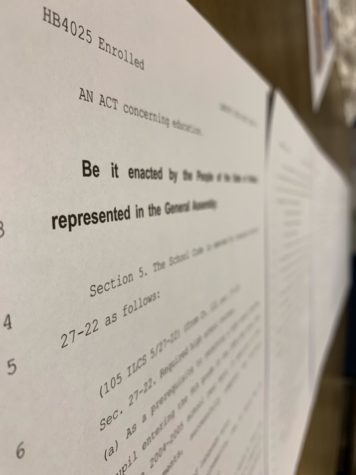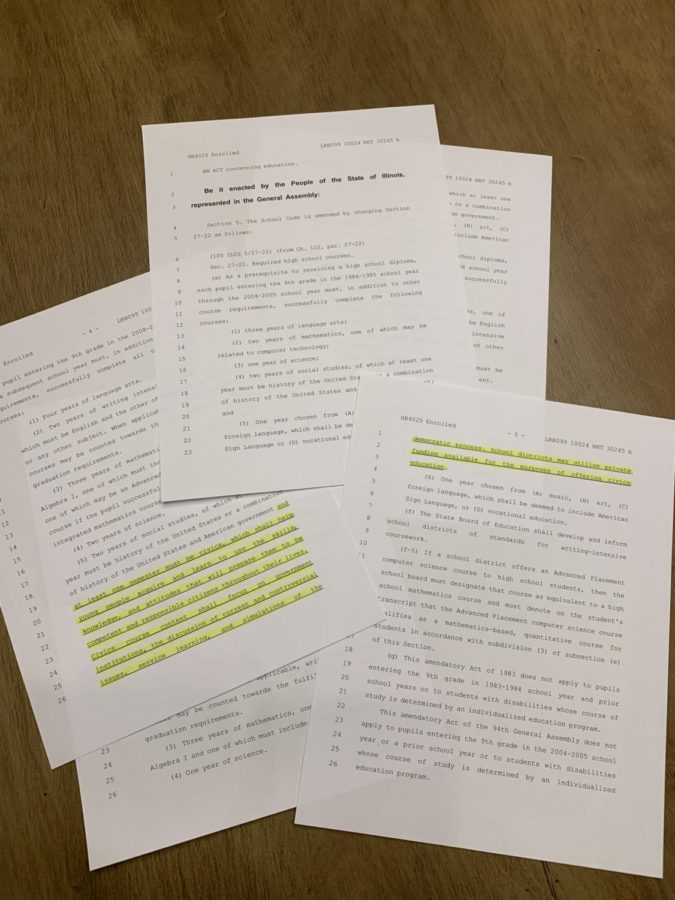Civics requirement: First year and future implications
November 16, 2018
While class enrollment may fluctuate from year to year, the social studies department has seen a notable decrease in certain classes in the first semester of the 2018-2019 school year. There are two main factors that could have caused this: increase in AP Government & Politics enrollment due to this being an election year and the Illinois civics mandate.
The Community High School District 99 Academic Planning Guide cites the following as the current requirements to receive a diploma: four credits of English or language arts, four credits of physical education, three credits of mathematics, three credits of social studies, two credits of science, half a credit of career and technical education, half a credit of fine arts and half a credit of consumer education.

2018-2019 District 99 Academic Planning Guide
Within the three social studies credits, students are required to take either American Government, AP US Government & Politics, Law and American Society, US Foreign Policy or Multicultural Studies in American Society.
This requirement is the result of a state mandate signed by Governor Bruce Rauner on Aug. 21 2015, requiring high school students in Illinois to complete a semester-long civics course in order to graduate. According to IllinoisCivics.org, “Course content must include instruction on government institutions, current and controversial issues discussions, service learning and simulations of democratic processes.” This mandate first went into effect for the 2016-2017 school year, applying to the class of 2020.

Focusing in on the top of Illinois House Bill 4025.
The civics mandate is something that will affect all DGS students after the class of 2019, which will bring a significant impact to the entire student body. The class of 2020 are currently juniors at DGS, and all of the approved civics classes at DGS are junior/senior-only elective options. This means that the 2018-2019 term was the first year that course enrollment data saw any fluctuation due to the implementation of the civics requirement.
Social Studies Department Head Dr. Christopher Esposito was able to shed some light on the way that DGS fit the civics requirement into its curriculum and how that revolved around a primary goal to meet both the requirement and the needs of students.
“The way that we decided to do it was to have it as a junior/senior elective and give [students] five different options in order to fulfill it. That way [students] could at least pick something that was of interest to [them],” Esposito said.
Because this is the first year that students are experiencing the effects of this mandate, there is only one data set to use when analyzing the effect this requirement has had on non-civics courses. There have been some decreases in the enrollment sizes of non-civics classes and an increase in the civics classes.
Georgia Hash, Assistant Principal for Curriculum and Instruction discussed the classes that were adversely affected by the civics mandate and her expectations for the numbers of the next academic year.
“The classes that seemed to lose some enrollment were AP Microeconomics, Anthropology and both levels of Psychology. I don’t think that there will be a huge swing back the other way, but I do think that we may see those four classes go back up a little because I anticipate students opting to take some of them as senior year electives since they couldn’t fit them in as juniors,” Hash said.
Esposito compared the quantitative data of course enrollment between the 2017-2018 and 2018-2019 school years, starting with the courses that largely stayed constant with their enrollment.
“The total number of sections stayed the same in AP European History and Ancient Medieval History. Contemporary American Issues went up by one, but that’s not a civics course. AP Microeconomics went down by two, there could be a correlation there because more students went into AP US Government and Politics; however, it’s an election year, so it’s hard to tell exactly,” Esposito said.
Esposito then moved onto the data regarding the enrollment in social studies courses that saw fluctuation from the 2017-2018 year to the 2018-2019 year.
“Law in American Society went from six to 13, so that was a huge change. Sociology of Gender went from six to five, Anthropology went from seven to four, Multicultural Studies went from two to five, Modern World History stayed the same, Personal Economics stayed the same, Psychology went down by two, AP Psychology went down by one or two, US Foreign Policy went up by two — that’s a civics requirement — AP US Government & Politics went up by two (another civics requirement) American Government went up by three (another civics requirement). So it had maybe a minor effect on some of the behavioral sciences,” Esposito said.
Though the requirement may not have affected students’ choices in courses, it has changed many classes and shifted many instructors within the Social Studies Department, specifically the Law in American Society course.
AP European History teacher Brian Caldwell feels that the civics requirement is a contributing factor to the decline in enrollment in his course.
“I think [the mandate] could spell trouble for the future of the course, but I think the potential bigger impact on our numbers, is the correlation with numbers in AP US [History]. A lot of students that take AP US, probably about half go on to take AP Euro after that. So, if our numbers were to start going up in AP US, then I think AP Euro will be fine, and we’ll be able to maintain at least two sections every year,” Caldwell said.
Additionally, Counselor Kate Blader discussed her observations regarding the course selection process and its relationship to the civics mandate.
“What I’ve found in meeting with my students is that a lot of the classes that fulfill a civics requirement were classes that students typically like to take anyway, so within those requirements there was usually at least one class that a student was interested in any way,” Blader said.
Sophomore Annie Le helps to affirm Blader’s observation. Though she is a sophomore and not yet eligible for enrollment in civics-approved courses, Le is aware of what the civics requirement is and does not feel it has shifted her away from classes she would’ve originally taken.
“I’ve got a lot of requirements I need to hit before I graduate, and this one is one I’ve put a lot of thought into. I think the fact that they can be AP classes makes them both enticing and intimidating simultaneously, but I think they provide a pretty wide range of options and that’s something I like,” Le said.
Similarly, junior Marco Oceguera feels that the implementation of the civics requirement is a positive change at DGS.
“I think that it’s beneficial and needed because a lot of people are super uneducated on the things discussed in these classes,” Oceguera said.
Robyn Fardy teaches AP US Government & Politics, as well as Law in American Society and Sociology of Gender. She shared her opinion on the civics mandate. Fardy teaches two civics electives and one non-civics elective and can see the merits of both opinions regarding the civics requirement.
“I truly believe that all students should be exposed to a civics/government course to become better-engaged citizens in our democracy. It is sad and scary how little most adults know about how our government works. To the opposite point, I have seen enrollment in Sociology of Gender decline since the inception of the civics requirement. I also believe that this course is an essential one for all students, and it is tough to watch the numbers go down,” Fardy said.
Caldwell also mentioned that some of his discontent lies within the fact that DGS met almost all of the civics requirements in the US History course. He “[didn’t] feel like the civics requirement was a necessity.”
The social studies department offers numerous electives to its students, and it is possible that the enrollment in these courses could be adversely affected in the future. While many teachers and students have varying opinions on the mandate and what it entails, the ultimate effects remain unseen thus far. It will take a few more years for District 99 to truly have a solid grasp of how the civics requirement has affected its school climate.
